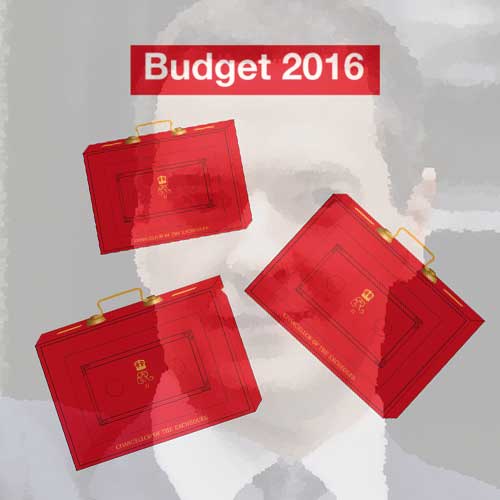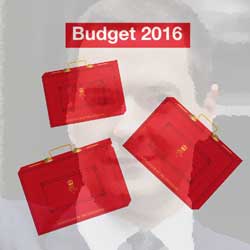In just under two hours, Chancellor George Osborne will deliver his 2016 Budget.
We have already provided a breakdown of what we think this Budget will reveal and the outlook is not bright based upon reports that growth estimates are to be revised down and the deficit reduction plan is not on target.
We will add each of the key points raised here, categorised into the specific area they relate to.
Economy
- Economic growth forecast down as predicted, four months ago GDP growth was placed at 2.4% for 2016 - today it is revised to 2%. Growth for 2017 and 2018 also revised down at 2.2% and 2.1% respectively. Blamed downward revisions on global trouble.
- Budget surplus still on target, even though borrowing next year will be £1 for every £14 spent - this is better than the £1 in every £4 stated before.
- 150,000 more jobs have been created than previously forecast with the unemployment rate falling, fastest in the North and 90% of jobs created are skilled jobs. Target to create a million new jobs by 2020.
- Inflation targeted at 0.7% in 2016 and 1.6% for 2017 - aiming for the 2% BoE target.
- Debts to GBP ratio above target but when adjusted for growth, debts are £9 billion lower than forecast. This still means the deficit reduction target is missed with the budget deficit at 2.9% in 2017, 1.9% in 2018 and 1% in 2019. In 2020 the Government hopes for a surplus of £10.4 billion. Public spending to fall to 36.9% of the budget by 2020.
Pensions / Savings
- From 2017 the ISA limit is raised to £20,000.
- The introduction of a new 'Lifetime' ISA to encourage saving for retirement and property for those under 40 years of age. The Government will top up contributions into this ISA by 25% (£1 for every £4) invested as long as the money is used for a deposit on a home or used within retirement.
Tax
- Class 2 National Insurance abolished from 2018, saving currently £145.60 a year.
- Tax-free personal allowance to be raised to £11,500 from April 2017. This is combined with an increase to the higher rate threshold to £33,500 (or £45,000 including the allowance). This compares as a £500 increase in the tax-free allowance and £1,500 increase in the higher rate threshold compared to April 2016-on.
- Capital gains changes see the basic rate reduced to 10% and the higher rate to 20%. This is a cut of 8% from each band headline but doesn't apply to residential property gains.
- Corporation Tax reduced further. In 2020 the rate will be slashed to 17% from the current setting of 18%.
- Multinational companies diverting taxation away from the UK by taking out loans and paying interest using UK turnover to be targeted with a new 30% cap on interest deductions attracting tax relief.
- 'Micro-Entrepreneurs', classified as people trading goods online from home on services such as eBay and those renting out rooms online via 'AirBnB' services to be provided with a £1,000 tax free allowance boost.
- Business rates threshold raised from £6,000 to £15,000 for small businesses.
- Companies producing sugary drinks will be levied with a new tax.
Duties
- Fuel duty, beer, cider, whisky and spirit duties all frozen. Others including wine raised by inflation.
- Insurance premium tax raised by a lower than expected 0.5%. It is now 10%, up from 6% just one year ago.
- Commercial property to see the same 'progressive' tax banding that is now applied to residential property.
While you wait for the updates, please use our 2016 Budget Calculator below.
It will be able to provide you with a fast comparison of the changes to your finances from last year, 2015, and how they compare from April 2016 on. We have included all taxation rates and allowances revealed from the Autumn Statement only four months ago and these should still stand - however, any changes announced by the Chancellor will be updated to the calculator as they are confirmed.
So, bookmark this page for all the Budget news as it happens!



